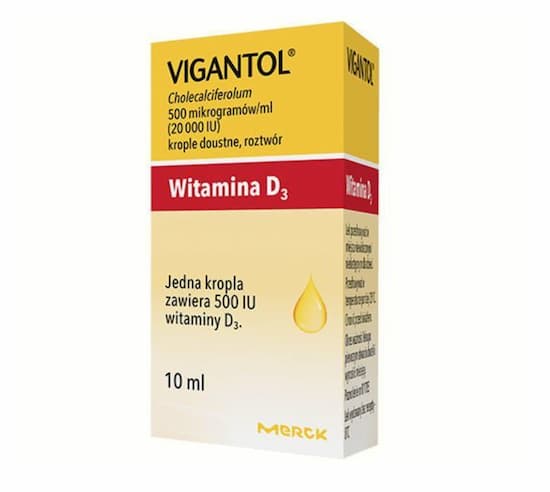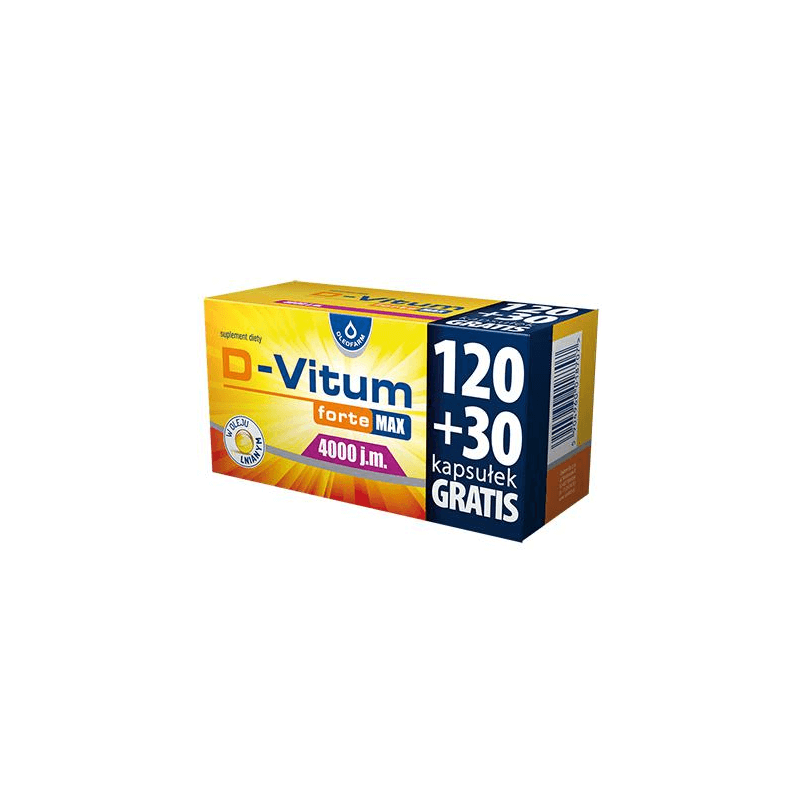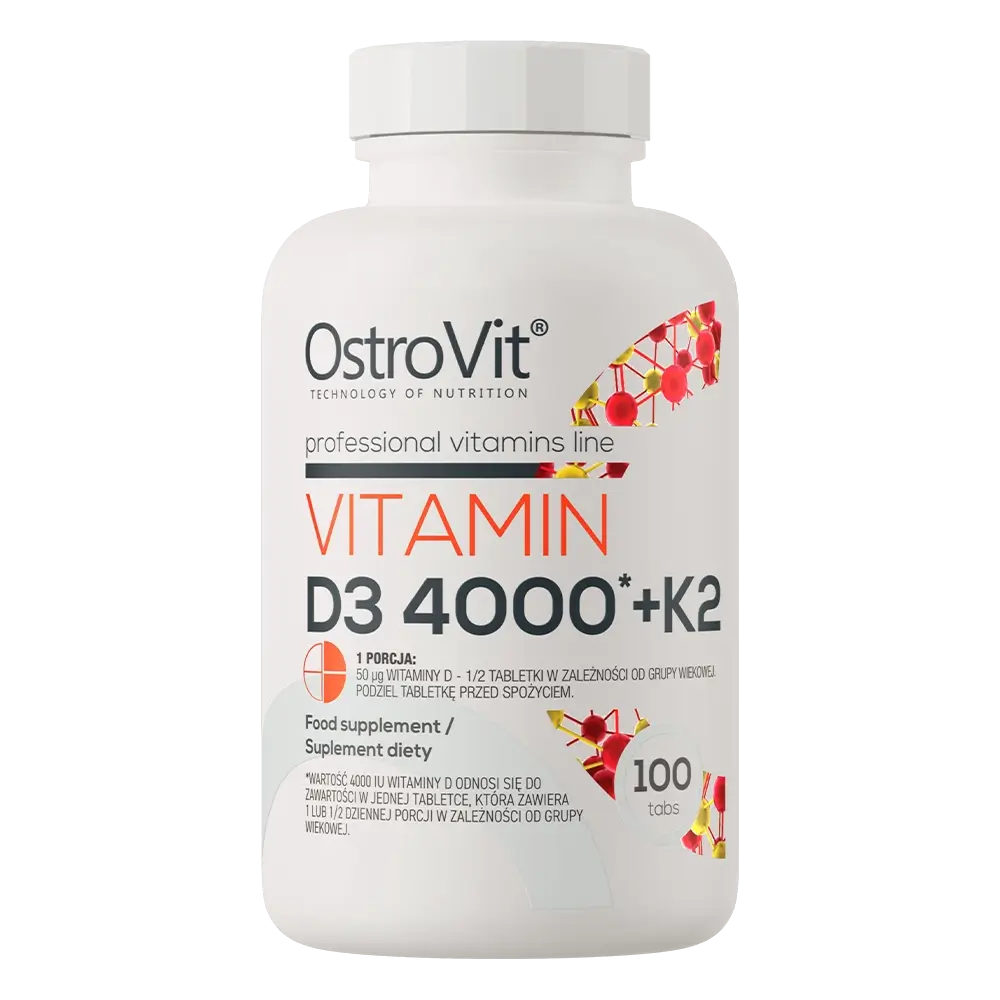Vitamin D deficiency - 12 symptoms to be concerned about
Vitamin D deficiency is common among Poles. Experts warn of the consequences of too little of the 'sunshine vitamin'. Unfortunately, there are no typical symptoms indicative of vitamin D deficiency.


Learn more about our editorial process
.

Learn more about our editorial process
.

Learn more about our editorial process
.
Why you can trust us
Articles on Natu.Care are written based on scientific research, data from government websites and other reliable sources. The texts are written in cooperation with doctors, nutritionists and other health and beauty experts. Articles are reviewed before publication and during significant updates.
.Learn more about our editorial process
.Information about advertisements
Content on Natu.Care may contain links to products from the sale of which we may receive a commission. When creating content, we adhere to high editorial standards and take care to be objective about the products discussed. The presence of affiliate links is not dictated by our partners, and we select the products we review ourselves completely independently.
.Learn more about our terms and Conditions
.Whoever has never diagnosed themselves online, let them cast the first stone! Looking for symptoms, comparing yourself to others and... getting a headache just from reading. Relax. Sit back and let yourself be served a factual pill.
In this article, you will learn about the possible symptoms of vitamin D deficiency and how to understand the signals sent by your body. Check out the expert opinion of Dr. Witold Tomaszewski, MD.
Description of contents:
- Learn the 12 symptoms of vitamin D deficiency
- Causes of vitamin D deficiency
- Effects of vitamin D deficiency
- Treatment of deficiency - what does the doctor say?
- Summary

Zobacz, co dla Twojego zdrowia może zrobić Natu.Care Witamina D 2000 IU. -15% z kodem BLOG15
Natu.Care Witamina D 2000 IU
Natu.Care Witamina D 2000 IU wspiera prawidłowe działanie układu odpornościowego, utrzymanie zdrowych kości i zębów oraz utrzymanie prawidłowych funkcji serca, nerek i układu mięśniowego.
Sprawdź cenę
Świetny produkt, tabletki są małe i wygodne do połknięcia. Plus za wysoką jakość!Joanna
See also:
- Vitamin D3 [action, dosage, supplementation]
- Vitamin D3 [ranking + expert opinion]
- Vitamin D3 drops [ranking + usage + expert opinion]
- Vitamin D overdose [symptoms + effects + what to do]
- Vitamin D [dosage + standards and recommendations]
- Vitamin D3 K2 [whether you need to combine them + expert opinion]
- What is vitamin D? [sources, table, examples]
- Maximum dose of vitamin D [which one + expert opinion]
Natu.Care Vitamin D 2000 UI
Product description
Vitamin D plays a crucial role in our health and well-being. It affects calcium and phosphate metabolism, which translates to healthy bones and teeth. It also helps regulate the immune system, and studies indicate its influence on the functioning of the nervous system.
Vitamin D, although called a “vitamin,” is actually a prohormone that our body produces on its own, primarily under the influence of sunlight. Unfortunately, our modern lifestyle contributes to deficiencies of this essential vitamin. Working in enclosed office buildings, using (necessary!) SPF creams, and covering the body with clothing all make it very difficult, if not impossible, to obtain adequate levels of vitamin D from sunlight. This is why appropriate, year-round supplementation is so crucial.
Vitamin D from Natu.Care is a well-tested vitamin D3 suspended in safflower oil, a plant known for its numerous health benefits. The convenient, easy-to-swallow capsule will make supplementation a part of your daily, healthy routine, improving your overall well-being.
Pros and cons
Pros:
- Ensures proper functioning of the immune system
- Supports the maintenance of healthy bones and teeth
- Maintains proper heart, kidney, and muscle function
- Tested by an independent, certified laboratory
- Convenient and easy-to-swallow capsule
- Clean composition - free from added sugar, gluten, GMOs, lactose, and without preservatives or colorants
Cons:
- None.
Additional Information
Pregnant women and breastfeeding mothers should consult a doctor before using the product. This dietary supplement is intended for a healthy adult population up to the age of 75.
OstroVit Vitamin D 4000 IU
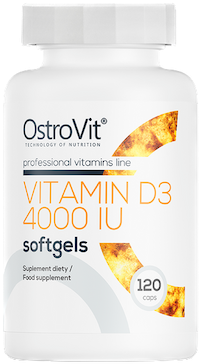
- Content vitamin D3: 4000 IU
- Form: capsules .
- Dose: 1 capsule per day .
- Sufficient for: 120 days .
Product description
OstroVit Vitamin D 4000 IU is a dietary supplement in the form of soft capsules, specially designed for peopleóing vitamin D deficiency, and especially recommended for seniorsów.
.Contains 4,000 IU of vitamin D per capsule, enabling effective dietary supplementation. The olive oil contained in the formula enhances the absorption of vitamin D, further enriching the supplement with healthy fats.
The supplement contains a wide range of vitamins and minerals.
The pack contains 120 capsules, allowing for four months of supplementation when taken with one capsule per day.
Pros and cons
OstroVit Vitamin D 4000 IU is a dietary supplement in the form of soft capsules, specially designed for peopleóing vitamin D deficiency, and especially recommended for seniorsów.
.Contains 4,000 IU of vitamin D per capsule, enabling effective dietary supplementation. The olive oil contained in the formula enhances the absorption of vitamin D, further enriching the supplement with healthy fats.
The supplement contains a wide range of vitamins and minerals.
The pack contains 120 capsules, allowing for four months of supplementation when taken with one capsule per day.
Additional information
OstroVit Vitamin D 4000 IU is a dietary supplement in the form of soft capsules, specially designed for peopleóing vitamin D deficiency, and especially recommended for seniorsów.
.Contains 4,000 IU of vitamin D per capsule, enabling effective dietary supplementation. The olive oil contained in the formula enhances the absorption of vitamin D, further enriching the supplement with healthy fats.
The supplement contains a wide range of vitamins and minerals.
The pack contains 120 capsules, allowing for four months of supplementation when taken with one capsule per day.
Dr. Jacob's Vitamin D3 drops
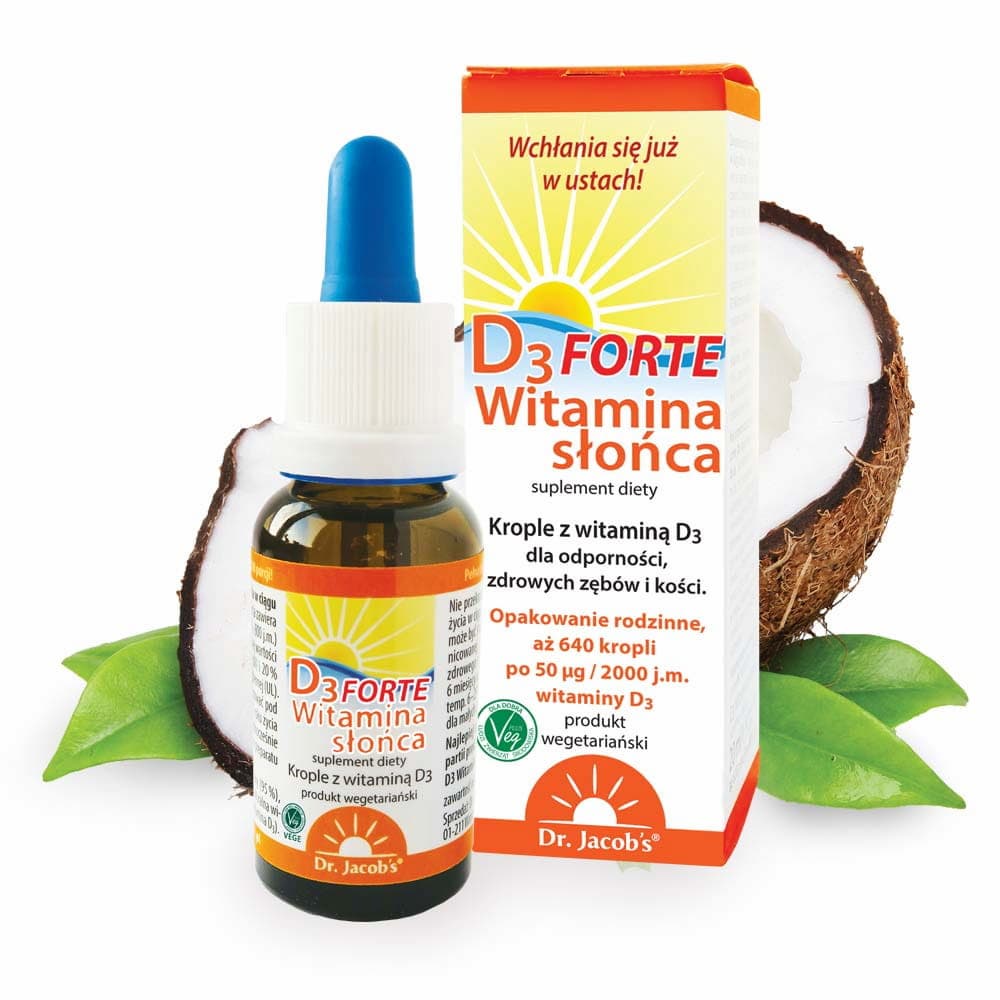
- Content vitamin D3: 800/1600 IU
- Form: drops .
- Dose: 1 or 2 drops daily .
- Sufficient for: 320–640 drops .
Product description
Sunshine Vitamin D3 FORTE is a dietary supplement containing a high dose of vitamin D3. Each drop of the product provides 800 IU of this essential vitamin for the proper functioning of the organism, whichóra supports the proper absorption of calcium and the maintenance of healthy bones, teethóra and muscles.
Pros and cons
Sunshine Vitamin D3 FORTE is a dietary supplement containing a high dose of vitamin D3. Each drop of the product provides 800 IU of this essential vitamin for the proper functioning of the organism, whichóra supports the proper absorption of calcium and the maintenance of healthy bones, teethóra and muscles.
Additional information
Sunshine Vitamin D3 FORTE is a dietary supplement containing a high dose of vitamin D3. Each drop of the product provides 800 IU of this essential vitamin for the proper functioning of the organism, whichóra supports the proper absorption of calcium and the maintenance of healthy bones, teethóra and muscles.
Vigantol witamina D3
Product description
Vigantol has been trusted by Poles for years. It is an over-the-counter medicine that you can buy at a good price at any pharmacy. It has a simple composition, without unnecessary additives and a small package that will fit into any home medicine cabinet.
Why is it worth it?
- The status of the medicine guarantees us the highest quality of the active ingredients, certainty about the dose and the effect of the preparation until the expiry date.
- Vigantol has an advantage over other over-the-counter vitamin D3 medicines because of the form of the drops.
- The drops are better absorbed by the body and do not need to be taken with a meal (unlike, for example, Vigantoletten, which is in tablet form and is recommended to be taken with a fatty meal).
Take note
- The bottle does not have a convenient dispenser. To measure the four recommended daily drops, turn the bottle upside down. The drops dispense slowly. When the liquid runs out, it is difficult to empty the bottle "dry" - a little is left inside.
- If the dispenser becomes clogged, gently tap the bottom of the bottle against the surface (tabletop, table) and then dispense the drops.
- You can use Vigantol for children, bearing in mind that 1 drop is 500 IU, and this is the requirement from the age of 3.
D-vitum
Product description
Oleofarm D-Vitum Forte Max 4000 IU is a dietary supplement in the form of capsules with high vitamin D content. The preparation is designed to supplement the diet of healthy adults over 75 years of age with this valuable active ingredient.
Pros and cons
Oleofarm D-Vitum Forte Max 4000 IU is a dietary supplement in the form of capsules with high vitamin D content. The preparation is designed to supplement the diet of healthy adults over 75 years of age with this valuable active ingredient.
Additional information
Oleofarm D-Vitum Forte Max 4000 IU is a dietary supplement in the form of capsules with high vitamin D content. The preparation is designed to supplement the diet of healthy adults over 75 years of age with this valuable active ingredient.
Expert opinion
OstroVit Vitamin D3 4000 + K2
Product description
A dietary supplement in tablets supplementing the diet with vitamin D and K. Vitamin D helps in the proper absorption and utilisation of calcium and phosphorus, and in maintaining a normal level of calcium in the blood. Vitamin K contributes to normal blood clotting and helps maintain healthy bones.
Pros and cons
A dietary supplement in tablets supplementing the diet with vitamin D and K. Vitamin D helps in the proper absorption and utilisation of calcium and phosphorus, and in maintaining a normal level of calcium in the blood. Vitamin K contributes to normal blood clotting and helps maintain healthy bones.
Additional information
A dietary supplement in tablets supplementing the diet with vitamin D and K. Vitamin D helps in the proper absorption and utilisation of calcium and phosphorus, and in maintaining a normal level of calcium in the blood. Vitamin K contributes to normal blood clotting and helps maintain healthy bones.
Expert opinion
Learn the 12 symptoms of vitamin D deficiency
There are no typical, characteristic symptoms of vitamin D deficiency. The following symptoms may also suggest other conditions. If you suspect a vitamin D deficiency - have your blood vitamin D3 levels tested. This is the surest action you can take to diagnose a deficiency.
 .
.
Dr. n. med. Witold Tomaszewski
.Symptoms of vitamin D deficiency:
-
fatigue, weakness,
. -
pain and weakness in muscles, joints,
-
solidification (osteoporosis) and softening (osteomalacia) of the bones,
- .
-
periodontal disease,
- bone disease.
-
immune disorders (frequent infections),
-
disorders of the immune system.
-
neurological manifestations,
- immune disorders (frequent infections),
- .
-
sleep disorders,
- hair loss,
- hair loss.
-
skin disorders,
- dermatological problems,
-
overweight,
- mental symptoms,
- impaired wound healing, decreased performance of the body
Read the explanation below to better understand these symptoms.
Are you looking for a good vitamin D supplement? Sunny Mood is a vegan vitamin D3 supplement in liquid drops. Thoroughly tested, convenient to supplement and highly bioavailable.
Fatigue, weakness
The rush of life makes it hard to balance family matters, work and time for pleasure. We may experience fatigue and weakness as a result . However, prolonged discomfort should worry us. This may suggest a vitamin D deficiency. Pay attention to recovery and the quality of your diet. Are you getting enough rest? Are you eating well?
Muscle pain and weakness, joints
Vitamin D deficiency can manifest as muscle pain, recovery problems after exercise, loss of muscle mass and muscle tremors . Are you experiencing these discomforts? If you are training hard and allowing yourself time to recover, yet the symptoms persist - it's time to visit your doctor and look for the cause.
Association (osteoporosis) and softening (osteomalacia) of the bones
Vitamin D plays an important role in calcium absorption and bone metabolism. Adequate levels of vitamin D protect our bone mass and reduce the risk of fractures. Deficiency can manifest as increased bone fragility and softening (osteomalacia) .
It used to be checked for vitamin D deficiency in infants with the so-called ping-pong ball sign. If the baby's skull when pressed with the fingers was flexible, like a table tennis ball, this was a signal of vitamin D deficiency.

Dr. n. med. Witold Tomaszewski
Periodontal diseases
Vitamin D deficiency promotes oral disease and is associated with a higher risk of dental malformations, caries, periodontitis and lower oral disease treatment . When was the last time you visited the dentist? Perhaps your pain or discomfort is linked to a vitamin D deficiency. It's worth getting it checked! Make an appointment with your dentist today.
Immune disorders (frequent infections)
You catch infection after infection, you feel that you cannot fully recover - this could mean that your immune system is not working properly. There is an undeniable link between vitamin D levels and the immune system . Its deficiency or lack can have the effect of lowering immunity, resulting in more frequent infections.
Hair loss
This symptom is very easily confused with other ailments - hair falls out due to deficiencies of many other vitamins and micronutrients, excessive stress or thyroid problems . If you have noticed that your hairstyle is thinning, your hair is dull or you are finding more hair on your brush than usual, pay attention to your diet and relaxation. It is a good idea to determine the concentration of vitamins (including D) and trace elements in your body.
Sleep disorders
Sleep disorders associated with vitamin D deficiency include: shortened sleep length, reduced sleep quality, problems falling asleep, insomnia. If you are trying to take care of your sleep hygiene and still experiencing nighttime sleep problems, this could be a signal from your body that you are lacking vitamin D.
Dermal problems
Scientists are looking at the relationship between serum vitamin D levels and skin condition . How do you assess the condition of your skin? Dry, irritated, flaky, itchy, tight skin may suggest a vitamin D deficiency. Look out for this, especially in winter - it's easy to explain dry or tight skin when the heating is on and the air is dry.
Overweight
This is a symptom, but also one of the causes of sunshine vitamin deficiency. Vitamin D deficiency is more common in overweight people . The vitamin is stored in adipose tissue, so overweight people may have a higher daily vitamin D requirement. Is your weight correct? With your health and wellbeing in mind, maintain the recommended weight.
Psychiatric symptoms
Research scientific studies suggest that many people suffering from depression are also found to have low serum vitamin D levels. It is therefore possible that these two factors are linked. If you are experiencing anxiety and fears, feeling depressed and sad, this could be related to vitamin D deficiency . It is also a signal that you need help from a specialist psychiatrist or psychotherapist.
Are you troubled by your emotions or worried about the poor mental state of a loved one? You can seek help from the Crisis Helpline on 116 123. This is a free helpline and can be the first step to regaining your mental balance. Also check where your nearest psychiatrist or psychotherapist is accepted under NFZ at this link.
Disordered wound healing
Vitamin D increases the production of compounds that are key to the formation of new skin in the wound healing process . If your skin is taking longer than usual to heal after surgery or injury, recognise this as a wake-up call from your body. In one study showed that people with severe vitamin D deficiency were more likely to have higher levels of inflammatory markers that can interfere with the wound healing process.
Decreased body performance
Research suggests an important role for vitamin D in the formation of muscle mass, cardiovascular and respiratory fitness, and effects on inflammation, all of which affect our sports performance. Are you tiring faster than you used to? Is your fitness below your capabilities? Pay attention to your diet and recovery. If this aspect is neglected, you may be deficient in vitamins (including D) and micronutrients.
If you have noticed that some of the symptoms concern you or a loved one, do not delay! It's time for a blood test. If you want to have a full understanding of your health status - in addition to a vitamin D determination, get a baseline blood count, fasting glucose and lipid profile.
If you want to have a full understanding of your health status - in addition to a vitamin D determination, get a baseline blood count, fasting glucose and lipid profile.
Neurological symptoms
Neurological symptoms of vitamin D deficiency include:
- prolonged fatigue,
- sleeping problems,
- problems with memory, concentration, learning,
- headaches, migraines,
- bad mood, sadness and lack of motivation,
- depressive feelings (depression), .
- prolonged sleep problems
Specialists have been looking at the effects of vitamin D deficiency on the nervous system for years. Studies suggest that vitamin D deficiency can impair various brain functions . Insufficient vitamin D levels can be linked to dizziness, memory problems, concentration and motor coordination.
Maybe of interest to you:
Deficiency in children: are the symptoms different?
Vitamin D deficiency is common in children of all ages across the world . Children up to 2 years of age are particularly vulnerable to deficiency, mainly through inadequate sun exposure and breastfeeding them without additional vitamin D supplementation. During the intensive growth phase, a child can develop abnormally if it lacks vitamin D, among other things.
What to look out for in child ?
5 symptoms characteristic of children:
-
Muscle aches awakening the child from sleep.
Muscle aches and pains.
-
Muscle weakness.
- Muscle weakness.
-
Delayed growth, valgus and scoliosis of the knee, rickets.
-
Delayed growth, valgus and scoliosis of the knee, rickets.
-
Delay in walking ability.
- Delay in walking ability.
-
Disorders of calcium-phosphate metabolism: tetany, cardiomyopathy, seizures.
-
Disorders of calcium-phosphate metabolism: tetany, cardiomyopathy, seizures.
- .
Prevention is better than cure. From the first days of your child's life, establish with your doctor what his or her correct diet should consist of. In the case of vitamin D, make sure that its supply complies with the RWS (Reference Intake Values) and does not exceed the recommended daily allowance. Why? Vitamin D is also found in many products intended for children (so-called fortified foods - milks, supplements, 'soups', snacks).
 .
.
Dr. n. med. Witold Tomaszewski
.Cause
Our body can produce vitamin D by dermal synthesis. This is a natural chemical reaction, created by the penetration of ultraviolet rays into the deeper layers of the epidermis. Despite this, many people have insufficient concentrations of vitamin D .
Vitamin D deficiency - risk groups
-
Inhabitants of geographic regions where sunlight is limited, especially in winter .
-
Persons with limited exposure to the sun (office work, shift work, nursing home patients) .
-
Persons with darker skin , as the pigment has a protective effect on the skin by reducing vitamin D3 production.
-
Newborns, because with each month their diet becomes poorer in vitamin D-enriched products (porridge, modified milk) and due to intensive growth .
-
Persons over 65 years of age, as the skin's ability to produce vitamin D decreases with age .
-
Persons taking drugs that affect vitamin D absorption, e.g.: glucocorticosteroids, antifungals, cholesterol-lowering drugs, antiepileptic drugs .
-
Persons diagnosed with
- .
If, when reading the above list, you thought to yourself "that's about me" or "that's about my loved one". - think about having your vitamin D levels determined!
Effects
The effects of deficiency are a worsening of the symptoms you have read about above. Untreated vitamin D deficiency can lead to:
Treatment of deficiency - what does the doctor say?
Are you experiencing the above symptoms? One, or perhaps several? Not sure if vitamin D deficiency affects you? Find out what our expert advises!
There are no typical, characteristic symptoms of vitamin D deficiency. To diagnose a deficiency of this vitamin in the body, we should determine the serum vitamin D concentration. This is the basis for appropriate treatment..
In special cases, extended investigations may also be performed, including assessment of calcium-phosphate metabolism (serum calcium and phosphorus concentrations and daily urine collections) and parathormone concentrations.
Referral for a serum vitamin D test can be made by a specialist doctor or we can do it privately..
Treatment consists of choosing an individual vitamin D dose and then sensible supplementation. I also recommend that they change their eating habits and encourage patients to be physically active outdoors.
.
 .
.
Dr. n. med. Witold Tomaszewski
..
Considering vitamin D supplementation? Be sure to read the article written with an expert about vitamin D3 drops. Once you have chosen your supplement, check recommended dosage.
.A good vitamin D supplement? Sunny Mood is a vegan vitamin D3 drop. Highly bioavailable and convenient for supplementation.
See also:
- Vitamin K2 [properties + occurrence + contraindications]
- Vitamin K [occurrence + effects + deficiency symptoms]
- Omega acids [types + properties + deficiency]
- Omega-3 fatty acids [characteristics + use + types]
- Omega-3 in tablets [top 10 products according to experts]
- DHA acid [what it is + health properties + sources]
- Tran: what it is, types, properties, effects and dosage
- The liver [symptoms + how to care for it and what to avoid] .
Summary
You already know how to understand some of the worrying signals your body sends you. You don't need to read for the hundredth time about the symptoms of vitamin D deficiency, because you already know that the best diagnosis will be made by your blood test results.
Before I could get to the darkest scenarios on the internet, I checked my vitamin D concentration in my blood. I saved a lot of nerves! And have you had this test done? Let me know in the comments if there are more of us!
FAQ
.What causes vitamin D deficiency?
Chronic vitamin D deficiency can have serious consequences for your health. Here are the most important ones:
- weakening of the immune system - vitamin D helps to fight infections;
- osteoporosis - vitamin D helps absorb calcium, which is crucial for bone health;
- cardiovascular disease - lack of vitamin D can lead to increased blood pressure and lipid disorders;
- mood disorders and depression - vitamin D is important for mental health and a deficiency may increase the risk of depression;
- autoimmune diseases - it may increase the risk of diseases such as Hashimoto's, lupus erythematosus and type 1 diabetes; .
What are the causes of vitamin D deficiency?
The most important causes of vitamin D deficiency are:
- insufficient sun exposure - it is produced in the skin as a response to UVB radiation and when you spend too little time in the sun, you are not providing enough of the right stimulus;
- deficiencies in your diet - reach for eggs, cheese and oily fish, among others, more often;
- age - older people have less capacity to produce vitamin D and absorb it from food;
- absorption problems - these can be caused by conditions such as Crohn's disease, coeliac disease or pancreatic insufficiency;
- dark complexion - melanin reduces the skin's ability to produce vitamin D;
- overweight and obesity - vitamin D stored in adipose tissue is less available to other tissues; .
What are the symptoms of vitamin D deficiency?
Vitamin D deficiency is manifested by:
- weakness and muscle aches;
- fatigue and apathy;
- weakened immunity;
- weakness and increased brittleness of bones;
- dental problems;
- hormonal disorders; .
How to quickly correct a vitamin D deficiency and how long does it take to treat it?
The best way to replenish vitamin D is through regular skin exposure to the sun, a balanced diet and responsible supplementation.
Before starting actual treatment, blood tests should be carried out to determine the degree of deficiency and select an appropriate dose.
Polish principles of treatment and vitamin D supplementation suggest that therapeutic doses should be used for 1-3 months to achieve optimal levels of 30-50 ng/ml.
How much does it cost to test vitamin D levels?
The price of a vitamin D determination depends on the specific laboratory and ranges from £75 to as much as £100. It is a blood test, needed to determine the level of deficiency and select the best dose of vitamin D for supplementation. You do not need to be fasting for the test, you can take it at any time, and you will wait 1 working day for the results.
When to take vitamin D - in the morning or in the evening?
.
There is no strict time of day to take vitamin D, although morning hours may be more convenient and better. Vitamin D, may affect melatonin production and make it more difficult to fall asleep, but there is currently no conclusive research on this. The best option is to find a time that is most convenient for you - you can allow yourself to experiment in a healthy way. Most importantly, consume it with a meal to facilitate the absorption of vitamin D, which is fat-soluble.
Does vitamin D calm you down?
Research shows that low levels of vitamin D can increase symptoms of anxiety, fear, depression and stress. This is also linked to the fact that vitamin D and omega-3 acids regulate the production of serotonin, a neurotransmitter that affects our emotions, mood, concentration and memory, among other things.
Sources
See all
Almeida, A. C. F., Paula, F. J. A. de, Monteiro, J. P., Nogueira-de-Almeida, C. A., Ciampo, L. A. D., Aragon, D. C., & Ferraz, I. S. (2018). Do all infants need vitamin D supplementation? PLoS ONE, 13(4). https://doi.org/10.1371/journal.pone.0195368
Antonucci, R., Locci, C., Clemente, M. G., Chicconi, E., & Antonucci, L. (2018). Vitamin D deficiency in childhood: old lessons and current challenges. Journal of Pediatric Endocrinology & Metabolism: JPEM, 31(3), 247-260. https://doi.org/10.1515/jpem-2017-0391
Berridge, M. J. (2017). Vitamin D deficiency and diabetes. Biochemical Journal, 474(8), 1321-1332. https://doi.org/10.1042/BCJ20170042
Botelho, J., Machado, V., Proença, L., Delgado, A. S., & Mendes, J. J. (2020). Vitamin D Deficiency and Oral Health: A Comprehensive Review. Nutrients, 12(5), Article 5. https://doi.org/10.3390/nu12051471
Chanchlani, R., Nemer, P., Sinha, R., Nemer, L., Krishnappa, V., Sochett, E., Safadi, F., & Raina, R. (2020). An Overview of Rickets in Children. Kidney International Reports, 5(7), 980-990. https://doi.org/10.1016/j.ekir.2020.03.025
de la Puente Yagüe, M., Collado Yurrita, L., Ciudad Cabañas, M. J., & Cuadrado Cenzual, M. A. (2020). Role of Vitamin D in Athletes and Their Performance: Current Concepts and New Trends. Nutrients, 12(2), 579. https://doi.org/10.3390/nu12020579
Fiscaletti, M., Stewart, P., & Munns, C. (2017). The importance of vitamin D in maternal and child health: A global perspective. Public Health Reviews, 38, 19. https://doi.org/10.1186/s40985-017-0066-3
Gao, Q., Kou, T., Zhuang, B., Ren, Y., Dong, X., & Wang, Q. (2018). The Association between Vitamin D Deficiency and Sleep Disorders: A Systematic Review and Meta-Analysis. Nutrients, 10(10), Article 10. https://doi.org/10.3390/nu10101395
Hussein, Y. H. H., & Soliman, A.-Z. M. (2023). Dietary habits, lifestyle changes, and glycemic control in patients with type 2 diabetes mellitus during coronavirus disease 2019 (COVID-19): A cross-sectional study in Egypt. Journal of Family and Community Medicine, 30(1), 1. https://doi.org/10.4103/jfcm.jfcm_114_22
Iruzubieta, P., Terán, Á., Crespo, J., & Fábrega, E. (2014). Vitamin D deficiency in chronic liver disease. World Journal of Hepatology, 6(12), 901-915. https://doi.org/10.4254/wjh.v6.i12.901
Mackawy, A. M. H., Al-ayed, B. M., & Al-rashidi, B. M. (2013). Vitamin D Deficiency and Its Association with Thyroid Disease. International Journal of Health Sciences, 7(3), 267-275.
Maldonado, G., Paredes, C., Guerrero, R., & Ríos, C. (2017). Determination of Vitamin D Status in a Population of Ecuadorian Subjects. The Scientific World Journal, 2017, 3831275. https://doi.org/10.1155/2017/3831275
Mehta, V., Agarwal, S., Mehta, V., & Agarwal, S. (2017). Does Vitamin D Deficiency Lead to Hypertension? Cureus, 9(2). https://doi.org/10.7759/cureus.1038
Mulligan, J. K., Nagel, W., O'Connell, B. P., Wentzel, J., Atkinson, C., & Schlosser, R. J. (2014). Cigarette smoke exposure is associated with vitamin D3 deficiencies in patients with chronic rhinosinusitis. The Journal of Allergy and Clinical Immunology, 134(2), 342-349. https://doi.org/10.1016/j.jaci.2014.01.039
Murdaca, G., Tonacci, A., Negrini, S., Greco, M., Borro, M., Puppo, F., & Gangemi, S. (2019). Emerging role of vitamin D in autoimmune diseases: An update on evidence and therapeutic implications. Autoimmunity Reviews, 18(9), 102350. https://doi.org/10.1016/j.autrev.2019.102350
Napiórkowska, L., & Franek, E. (2009). The role of vitamin D determination in clinical practice. Cardiovascular Diseases, 6(4), Article 4.
Olmedo Martín, R. V., González Molero, I., Olveira Fuster, G., Amo Trillo, V., & Jiménez Pérez, M. (2019). Vitamin D deficiency in outpatients with inflammatory bowel disease: Prevalence and association with clinical-biological activity. Revista Espanola De Enfermedades Digestivas, 111(1), 46-54. https://doi.org/10.17235/reed.2018.5714/2018
Parva, N. R., Tadepalli, S., Singh, P., Qian, A., Joshi, R., Kandala, H., Nookala, V. K., & Cheriyath, P. (n.d.). Prevalence of Vitamin D Deficiency and Associated Risk Factors in the US Population (2011-2012). Cureus, 10(6), e2741. https://doi.org/10.7759/cureus.2741
Passeron, T., Bouillon, R., Callender, V., Cestari, T., Diepgen, T. L., Green, A. C., van der Pols, J. C., Bernard, B. A., Ly, F., Bernerd, F., Marrot, L., Nielsen, M., Verschoore, M., Jablonski, N. G., & Young, A. R. (2019). Sunscreen photoprotection and vitamin D status. British Journal of Dermatology, 181(5), 916-931. https://doi.org/10.1111/bjd.17992
Pennisi, M., Malaguarnera, G., Di Bartolo, G., Lanza, G., Bella, R., Chisari, E. M., Cauli, O., Vicari, E., & Malaguarnera, M. (2019). Decrease in Serum Vitamin D Level of Older Patients with Fatigue. Nutrients, 11(10), 2531. https://doi.org/10.3390/nu11102531
Siadat, Z. D., Kiani, K., Sadeghi, M., Shariat, A. S., Farajzadegan, Z., & Kheirmand, M. (2012). Association of vitamin D deficiency and coronary artery disease with cardiovascular risk factors. Journal of Research in Medical Sciences : The Official Journal of Isfahan University of Medical Sciences, 17(11), 1052-1055.
Sizar, O., Khare, S., Goyal, A., & Givler, A. (2022). Vitamin D Deficiency. In StatPearls. StatPearls Publishing. http://www.ncbi.nlm.nih.gov/books/NBK532266/
Sowah, D., Fan, X., Dennett, L., Hagtvedt, R., & Straube, S. (2017). Vitamin D levels and deficiency with different occupations: A systematic review. BMC Public Health, 17, 519. https://doi.org/10.1186/s12889-017-4436-z
Tiwari, S., Pratyush, D. D., Gupta, S. K., & Singh, S. K. (2014). Vitamin D deficiency is associated with inflammatory cytokine concentrations in patients with diabetic foot infection. British Journal of Nutrition, 112(12), 1938-1943. https://doi.org/10.1017/S0007114514003018
Umar, M., Sastry, K. S., Ali, F. A., Al-Khulaifi, M., Wang, E., & Chouchane, A. I. (2018). Vitamin D and the Pathophysiology of Inflammatory Skin Diseases. Skin Pharmacology and Physiology, 31(2), 74-86. https://doi.org/10.1159/000485132
Wakeman, M. (2021). A Literature Review of the Potential Impact of Medication on Vitamin D Status. Risk Management and Healthcare Policy, 14, 3357-3381. https://doi.org/10.2147/RMHP.S316897
Williams, S., Malatesta, K., & Norris, K. (2009). Vitamin D and Chronic Kidney Disease. Ethnicity & disease, 19(4 Suppl 5), S5-8-11.
Wong, S. K., Chin, K.-Y., & Ima-Nirwana, S. (n.d.). Vitamin D and Depression: The Evidence from an Indirect Clue to Treatment Strategy. Current Drug Targets, 19(8), 888-897.
.Editorials
Meet the team


Fact-checker
Agata Jach is in charge of verifying quoted sources and checking that published content is truthful.
![Vitamin B12 - where it occurs in the diet and in products [table].](https://cdn-resources.natu.care/uploads/1/balanced_diet_nutrition_healthy_eating_concept_food_sources_rich_vitamin_b12_cobalamin_kitchen_table_1_b84f75bda2.jpg)
Find out where vitamin B12 is found and which products will provide you with it.

Vitamin PP also known as niacin or vitamin B3 supports the proper functioning of the body.
![What is NMN? Effects, effects, side effects [supplements].](https://cdn-resources.natu.care/uploads/1/science_background_with_molecule_atom_abstract_structure_science_medical_background_3d_illustration_1_a5ec4d9cec.jpg)
Everything you want to know about NMN: properties, effects, safety and expert opinions.

